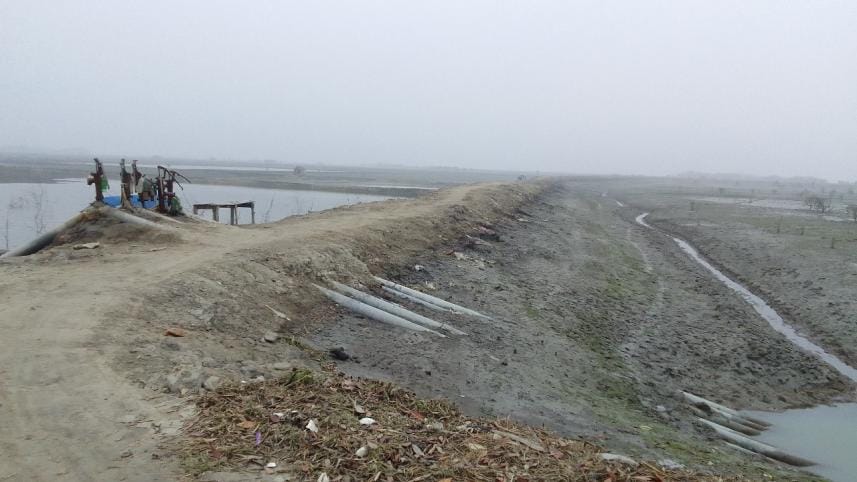How salinity corrodes the lives of Sundarbans women

Every morning, as soon as the sun rises, the struggle for drinking water begins for 40-year-old Momotaj Begum. A resident of Chalkbara village in Gabura Union, she lives with her family of four. Her day starts with fetching water for the household from a neighbour's pond, located nearly a kilometre away from her home.
On a typical day, Momotaj fetches water twice. "Early in the morning, I go to my neighbour's pond to collect water for cooking and drinking. After finishing the household work, I fetch water again in the late afternoon. This is my regular routine," she says. She adds, "Water is everywhere, but there is an acute scarcity of safe drinking water due to salinity. Salinity is a curse for us. I feel a sense of relief during the monsoon season, as the rainwater provides drinking water that lasts for about three to four months."

Gabura is an island union located in Shyamnagar Upazila of Satkhira district. Like other coastal districts, Satkhira is one of the areas most affected by salinity, where both surface and groundwater are increasingly saline. Salinity is further exacerbated by the impacts of climate change. As a result, the scarcity of fresh drinking water has become much more severe than before. Each year, groundwater levels drop rapidly due to erratic rainfall, prolonged dry seasons, and excessive water extraction.
In addition, being a coastal district, saltwater intrusion caused by natural factors—such as sea-level rise, tidal surges, and cyclones—has a significant effect on freshwater sources. Scientific findings and ethnographic research suggest that, alongside these natural causes, the cultivation of shrimp and, more recently, soft-shell crab farming are notably intensifying salinity levels in both water and soil.

As an alternative source of drinking water, people sometimes resort to using tubewells. However, the water from most tubewells is saline and often contaminated with arsenic and iron. Although deep tubewells generally provide arsenic-free water, their high installation costs and the presence of dense slate layers often make installation difficult.
Momotaj narrated, "We suffer for water, and our suffering comes from water. Most of the people are aware of the water crisis that we face. How many of you care about our physical burden caused by fetching water? I am sick. Yet I have to collect water every day. After carrying the water, my body and legs often start to ache. Even during my menstrual period, I have to fetch water to run the family. I do not have any option to skip it."

Sometimes the scarcity of fresh drinking water forces them to use saline water. It has diverse negative impacts on all, though pregnant women are at increased risk of high blood pressure, miscarriage, and premature birth. Research reports say that saline water is no longer an individual problem; rather, it has become a serious concern across the coastal area of the Sundarbans.
Salinity is now no longer confined to physical or climatic phenomena. It has become a social stigma in the coastal belt. Momotaj said, "People from freshwater areas are not willing to marry off their daughters here due to the water crisis caused by salinity. They are also reluctant to marry anyone from this area. Like others, I am worried about my daughter." She continued, "Even my relatives who stay in the freshwater area often avoid visiting my home. They say, you don't have fresh water. Where will we bathe? Saline water will darken our skin." In the coastal area, salinity has become a curse.

The women of the Sundarbans are paying the highest price for salinity. The use of saline water damages their hair and skin. Their bodies are turning darker. The signs of ageing on their skin tend to appear at a faster pace than in other parts of Bangladesh. Late marriage costs a large amount of dowry. Thus, parents always try to arrange an early marriage for their daughters.
Today, in the coastal areas of the Sundarbans, salinity and the scarcity of safe drinking water create the greatest divide between the people—the people of saline water and the people of freshwater. Most affluent households are migrating to urban areas in order to build a better and more secure life. But for people like Momotaj, who have nothing left, how do they survive?
Unless the nation listens to these voices and acts with urgency, the salt that seeps into their water will continue to seep into their lives, hardening lines of suffering for generations to come.
Md Rahamatullah is a PhD researcher at South Asian University and can be contacted at rahamatullah17bsmrstu@gmail.com.
Follow The Daily Star Slow Reads on Facebook for more long-form stories crafted for thoughtful readers. To contribute your article to The Daily Star Slow Reads, see our guidelines for submission.



 For all latest news, follow The Daily Star's Google News channel.
For all latest news, follow The Daily Star's Google News channel.
Comments